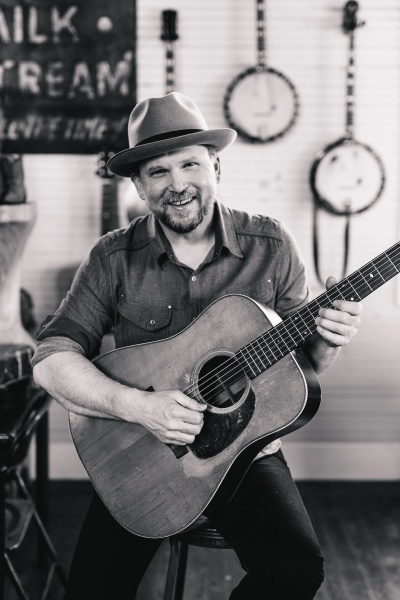14-time Grammy-winning musician talks ‘playing music in the Spirit’ allowing actions to be his witness

Fourteen-time Grammy Award-winning musician Ron Block says he allows his belief in God to speak through his actions and music collaborations with famous stars.
Block, who plays the banjo and guitar and sings and writes songs, is best known as a member of the bluegrass band Alison Krauss & Union Station. He has also worked with Country music icons like Dolly Parton, Alan Jackson, Reba McEntire and Vince Gill.
When asked by The Christian Post how he shares his faith with those he works with, he replied: “Musicians are just people.”
“Music played in the Spirit can touch some people in a way that a sermon or book or teaching sometimes won’t,” declared Block who wrote the book,Abiding Dependence, Living Moment by Moment in the Love of God (Moody Publishers), that encourages believers to dedicate more time to their faith, the Word, and communicating with God.
The following is a lightly edited Q&A of Block’s interview with CP where he shares how his faith is reflected in his work as a musician and songwriter.
CP: Your book stresses the importance of “beauty, peace and confidence of a deep faith.” Why is that important to emphasize?
Block: When we go through the wilderness trying to figure out life — who God is, what God wants from us, and how we’re to live — all that struggle and anguish become the necessary dark background to the light.
It’s a beautiful thing to help each other see more fully. My entire life has been a journey toward knowing what I know now, and what I’m learning, and what I will know in the future. Sharing the truths I’ve found, truths that actually work, seems to me to be one of the fundamental reasons for existence.
CP: You’ve won several Grammys, do you think the prestigious honor is clouded by all the crazy things that go on in the live show? An example would be Sam Smith‘s satanic-themed performance.
Block: I never looked at awards as any kind of end-all. For me, the main questions are, “Did I play well? Did I make the best music I could at the time?” It’s always of course a wonderful thing to be with the band and get some kind of recognition for all the work we put into our albums together. I’m glad for the Grammys we’ve won, and I always like telling my Dad we won one.
I don’t have a big thirst anymore for external validation in music; I essentially want to please my own musical sense and please the other people I’m playing with, and of course the audience. I love playing music — the music is the thing.
All that said, whatever people on TV shows do, I generally don’t expect them to act “Christian,” though many television shows and networks would be wise to understand that there is a huge segment of the population that has Christian values.
CP: What is something you’ve learned from working with iconic artists such as Alison Krauss, Dolly Parton, Reba McEntire, Vince Gill and Alan Jackson?
Block: It’s crucial to walk with God daily, maintain a sense of confidence, and know that hard work does pay off. Also, social skills are important. When recording with people at a high level, people who expect quick results, you’ve got to stay on your toes and work hard from a sense of faith in who God has made you. Also that people are still just people, no matter how iconic, no matter how rich, no matter how unknown, no matter how poor. All people need God.
CP: How do you, as a musician, witness God to those you get to work with?Isaiah Saldivar shares the importance of casting out demons by nameIsaiah Saldivar shares the importance of casting out demons by namehttps://imasdk.googleapis.com/js/core/bridge3.562.0_en.html#goog_1157336657https://imasdk.googleapis.com/js/core/bridge3.562.0_en.html#goog_1046989534https://imasdk.googleapis.com/js/core/bridge3.562.0_en.html#goog_2073865780Ads by Ad: (6)Skip Ad
Block: I love talking about God, about who He is, what He’s like, how He changes our lives. But the primary way God is revealed to others through us is by other means — through our attitudes, expressions, body language, through a sense of peace and rest that emanates from us when we’re abiding. When we practice the recognition of God as present and real, when that becomes a habit turning into a subconscious undercurrent, we’re going to affect people. They will feel loved and accepted in our presence. They’ll begin to feel they can talk to us, because they can.
So I take the pressure off myself to witness, to be something for God and I trust and expect God to be something in me for others. Sometimes that means keeping my mouth shut. Sometimes it means saying what comes into my heart to say. But the most important thing is to be sensitive to what is God-given, God-empowered, and appropriate, and what comes from my fleshly thinking that I’ve got to be a witness for God.
CP: Can you share a God moment you experienced while working on music with one of the aforementioned music stars?
Block: There’s a joy in playing music with high-level people that don’t showboat, where the entire band is intent on putting across the song. It’s a parallel to how the Body of Christ is supposed to work, setting aside ego, the need for attention or recognition, and simply doing the work because the work is its own reward. There’s a fulfillment in playing a good show, in working together as a team, and in seeing how the experience of emotionally-moving music is so often cathartic for people. It makes them feel and think about things they might often keep shoved down inside themselves.
CP: How do you encourage Christians to experience the richness and beauty of God in the world around us when it all looks so chaotic?
Block: We experience what we call the Christian life in a series of concentric circles. At first, from the outside, we see it as a bunch of rules and laws — going to church, prohibitions on doing this or that, trying to be good, and all that. When we see that Jesus is real, and that God loves us, and that through Christ we are forgiven of our sins, that’s another layer in. But we then often set about trying to be good — going to church, not doing this and not doing that, reading our Bibles, et cetera. All those are good, but we trust Jesus to get us to Heaven and trust church, our rules, Bibles, study groups, and books to help us to be good.
Once we begin to see there’s more to it than that, we go deeper and deeper. Often this takes some kind of struggle or crisis, the Romans 7 experience, where we cry, “Wretched man that I am!” It’s then that we’re going close to the center of the concentric circles. We begin to realize we don’t just need forgiveness and will be going to Heaven someday. We need love and power for today, here and now in this chaotic world. We need to love our families, friends and enemies.
That requires something more than our own human effort. It requires recognition of what God says is reality — Christ living in us, the power of God unto deliverance, our expectation of good coming to us, in us, and through us. It means we have power to live in this moment, right now, with love for God and others. It means that we have the source of all the fruit of the Spirit inside us as our source and ground of being. It means we can learn to know God in a union and unity of being with Him, listening, trusting and doing as He tells us. It’s then that we’re getting closer to the center of the circles.
CP: What do you believe is your mission?
Block: I’ve believed since I was in my early teens I was created to make music. I’ve always had a strong sense of the calling that I can’t get away from; I knew very early if I didn’t play music I’d be miserable. In my early 20s I had people say, “If you were really sold out to Jesus, you’d play only Gospel music.” I thank God I didn’t listen to that. No one tells a banker or engineer to work only at a Christian company, or for a waiter to work only at a Christian restaurant. We’re called to be salt and light in the world, and to do that we’ve got to be poured out of the safe little salt shaker.
Contained within that calling, playing music, is the idea that music can transmit Spirit. Not just Gospel music, or music with lyrics about Jesus, but simply music. Music itself was created by God and comes up out of who He is, like all forms of art. Music played in the Spirit can touch some people in a way that a sermon or book or teaching sometimes won’t.
For more information about Ron Block, visit his website.
Originally published on The Christian Post.






